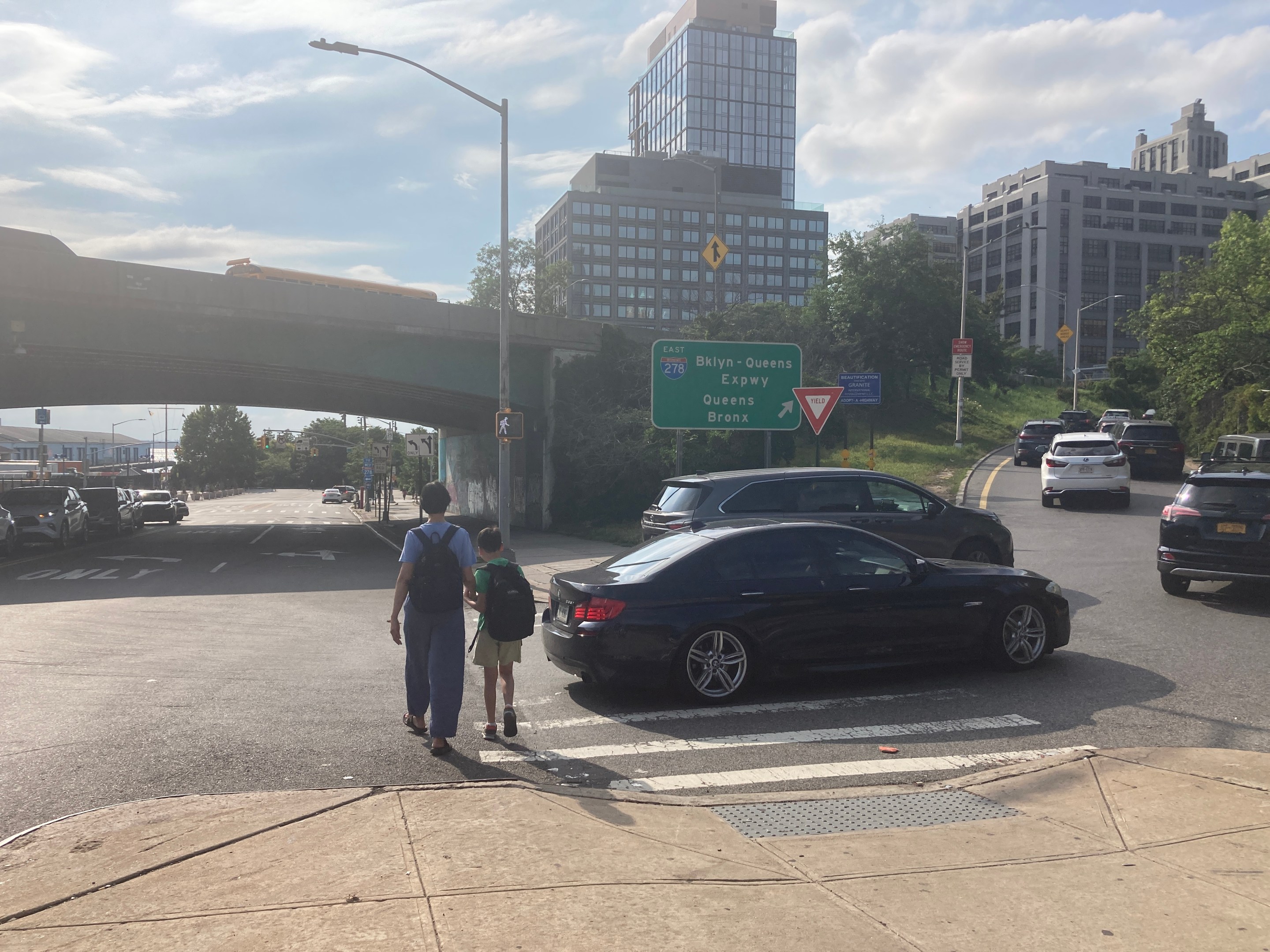The city is going back to the drawing board on its plans to redesign the chaotic Atlantic Avenue interchange of the Brooklyn-Queens Expressway, Streetsblog has learned, after local advocates and politicians rejected the Department of Transportation’s proposed makeovers that doubled down on the Robert Moses-era infrastructure.
Civic groups have instead demanded that the DOT reduce the car and truck links to the BQE — Atlantic Avenue being one of the "worst-designed ramps" in the city — and prioritize spaces for people.
Last month, transportation officials proposed three concepts to bring the winding set of highway entrances and exits around Atlantic Avenue up to modern federal safety standards as part of the Adams Administration’s larger project to rebuild — and possibly re-widen — the crumbling triple-cantilevered section of the BQE just north of Atlantic.
Two of the proposals for the area that DOT dubbed "Zone 5" would add a new highway off-ramp on Hicks Street south of the BQE, sending even more traffic into residential areas. Locals and experts lambasted the schemes as building out — rather than eliminating — automobile infrastructure, which was "right out of the Robert Moses playbook," one local state lawmaker said at the time.

Now, the agency is reconsidering, according to local civic and business groups.
"Thanks to the huge community showing at the June 15th meeting and overwhelming opposition to the proposals that were neither community nor pedestrian friendly, the DOT is headed back to the drawing board on Zone 5. At least for now, the proposed Hicks Street on-ramp is off the table," reads a July 18 newsletter by the Cobble Hill Association.
DOT must make Atlantic and nearby streets safer for people who have to cross the dangerous thoroughfare daily, rather than catering to automobiles, said Amy Breedlove, who leads the Cobble Hill Association’s BQE advocacy, and who confirmed she heard from DOT officials that they would reexamine the interchange’s overhauls after the searing feedback.
"I am glad that they [DOT] are not pursuing these three terrible concepts, but now let’s get it right," Breedlove told Streetsblog. "They continue to prioritize vehicular traffic over communities and human beings, both the health and safety of residents and users of our public streets... They’re still in the 1950s.”
A de Blasio-era BQE "expert panel" recommended in 2020 that the city close or limit access to several BQE ramps, including at Atlantic Avenue, in order to deter cut-through traffic in adjacent neighborhoods and reduce congestion.
DOT presented a concept as part of its proposals last month, which got rid of the Atlantic ramps, but also added new ones a block over at Hicks and Congress Streets. The agency's presentation slides noted the reconfiguration would cause "substantial" traffic backups from vehicles on Atlantic having to loop around via Columbia Street.
Cutting highway access in the area entirely was not feasible, DOT's project leader Julie Bero had said in March, because trucks needed to get to the nearby Red Hook container terminal.
But city officials under Mayor Adams have dismissed those suggestions, with DOT's project leader Julie Bero arguing earlier this year that the nearby Red Hook container terminal necessitated continued access for truck traffic via the Atlantic ramps.
The Atlantic Avenue Business Improvement District last week wrote to the agency's senior BQE project managers as they took another look, urging them to reconsider the BQE panel’s recommendations and close the local Queens-bound ramp — but not at the cost of building another larger ramp nearby.
"This area is more than on and off ramps for cars and freight, it also serves pedestrians and public transit," the BID wrote in a letter to DOT planners in charge of the BQE project on July 24.
The business group’s executive director said the city’s three proposals maintained car dominance on the corridor, whose poor design has cost lives.
"The city is enshrining Atlantic as a freight route, as a truck route, and we’re going to continue to advocate for rethinking on that," Kelly Carroll told Streetsblog. "The way people and vehicles use Atlantic Avenue could not be more disparate, and that’s why we have a body count."
The highway-like roadway bisecting Brooklyn has long been a death trap that DOT has labeled one of the most dangerous streets in the borough.
In April, a driver fatally struck 31-year-old Katie Harris at the intersection of Clinton Street, where three more pedestrians have died in crashes over the last decade. In the wake of Harris’s killing, local pols pushed the DOT to study adding mid-block crossings to the boulevard.
A DOT spokesman said the agency got "clear feedback" that they needed to keep working on the BQE interchange, adding that officials are looking into safety upgrades for the larger Atlantic Avenue corridor.
"NYC DOT received clear feedback in June that we need to continue to work with stakeholders to identify the best solution for this heavily utilized and complicated intersection to align with neighborhood and regional needs," said Vin Barone in a statement.






